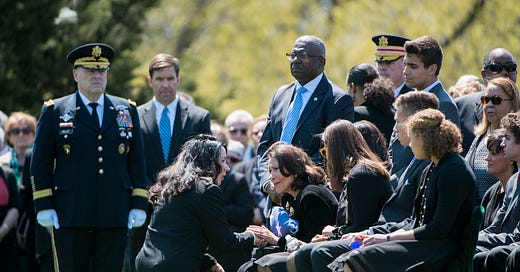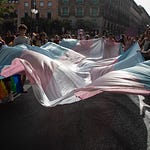[This blog will always be free to read, but it’s also how I pay my bills. If you have suggestions or feedback on how I can earn your paid subscription, shoot me an email: cmclymer@gmail.com. And if this is too big of a commitment, I’m always thankful for a simple cup of coffee.]
We practiced with caskets that were stored outside our barracks building. To simulate the weight of honored remains, we’d toss several full sandbags into the belly of the casket, and then, for hours and hours, we’d go through our exact movements.
Over and over and over and over.
Those were hot and humid D.C. summers, and it didn’t matter. Drink water. And then back at it. We’d march up crisply, pick up the casket, go through the entire funeral protocol—with an earned coordination that would rival any synchronized swimming team—and then do it again.
The first summer I was in the 3rd U.S. Infantry Regiment (The Old Guard), the A/C stopped working in our barracks. Think of the most depressing college dorm you’ve ever seen and remove air conditioning. We’d wake up in sweat in the middle of the night and open the fridge and stick in our face for a little relief.
We’d run through flag-folding drills at night in those hot barracks. We’d stand in the hallway in our casket teams, and we’d fold and fold and fold until we could do it in our sleep. Whatever you’ve seen in movies doesn’t come close. It is an exacting choreography. No movement wasted or erred.
Does the flag look perfect in presentation? Are the red and white stripes hidden? Are the stars symmetric? Is the cloth tight in the final form? No? Why the hell not? You’d give this to a mourning relative? Do it again. We will be here all goddamn night until you get this right.
Your exhaustion doesn’t matter. Better get some sleep. No excuses. I arrived at the unit as a 19 year-old Army private, not even being close to knowing that I didn’t know what I didn’t know. You sure as hell better learn and quick. Figure it out. Get yourself right. Pray if you’re the praying type.
Because families are flying in from all across the country for what will be one of the absolute worst days of their lives, shattered, maybe beyond repair, and all we can meagerly offer them is choreographed dignity in place of irreparable loss. It will never be close to enough. Perfection is never enough.
We’d spend so much time on our uniforms. There were presses in the basement. You think your barracks room is hot? Go downstairs and be hugged by steam. Learn how to use the press. Get those creases sharp. Eradicate all wrinkles. Ignore the sweat dripping into your eyes.
We carried micrometers with us to ceremonial details to ensure our uniforms were right — down to the centimeter. We’d shine every metallic surface on our bodies. What are fingerprints? We don’t know. We’d coat the soles of our shoes with edge dressing to turn them from grey to black.
I can’t believe I’m saying this now, but learning rifle manual and element marching was taking a break from everything else. Tedious as all hell. We wore steel plates on our shoes to click as we marched. They’d bang into our ankles at times, and you’d try not to swear. That was our break.
It was constant stress, all day, every day, and yet, we had it easy. If you want hard, go volunteer for the Tomb Guards. Go ahead and throw yourself into the actual deep end and find out if you can swim. Just raise your hand when they ask for volunteers.
Go to the Tomb, and work 18-hour days for months and months. You will learn everything there is to know about Arlington. You will memorize pages and pages of information. You will recite it all from memory, or you will fail. You will barely get sleep. You will have no life. There is only the Tomb.
I knew, deep down, I wasn’t ready for that. I respected it too much to raise my hand. I didn’t volunteer. My roommate volunteered. It was a curious decision on his part given that he struggled more than any other private. He definitely wasn’t ready, but God bless him for stepping up.
It takes nine months to earn the Tomb Badge, which, at the time, in terms of rarity within the U.S. military, was second only to the Astronaut Badge. Only 500 military personnel have earned the Astronaut Badge. Only 864 have earned the Tomb Badge. Walk in space or walk in front of the Tomb. That’s rarity.
My roommate was back with us in three months. He didn’t make the cut. Sink or swim at the Tomb. There is one standard: it is perfection and that’s all there is to it. He came back to us and had the sharpest, most squared away uniform in our entire company until the day he got out.
But the truth is that the Tomb Guards had it easy, too. We all had it easy. Because the hardest job in Arlington National Cemetery doesn’t involve wearing a uniform. The hardest job is being a cemetery official who is given the impossible task of bringing comfort to families.
I arrived at the unit in April of 2006. In January of 2007, Pres. Bush announced a dramatic increase in troop deployments to Iraq, now known as the Surge.
For three consecutive months that year—April, May, and June—there were over 100 U.S. military fatalities in Iraq — the deadliest year for U.S. service members in the Global War on Terror.
They came back in transfer cases on a C-130 at Dover Air Force Base, and I honestly don’t know how many of them wound up buried in Arlington. But I know there were a lot. I know we were pretty busy. All day carrying caskets or leading the caisson horses or marching behind them.
That’s not including the many fatalities in Afghanistan. That’s not including the old veterans who had passed and long ago earned the right to be buried there or their family members who qualified for burials, too. Funerals, funerals, and more funerals. That sums up 2007 for The Old Guard.
Who leads on caring for the families on one of the worst days of their lives? Who plays the painful combination of clergy and therapist to the aggrieved? Who does whatever they can for the ceremonial units? Who enforces respect for that hallowed ground?
Cemetery officials.
Day after day, month after month, year after year, it’s the cemetery officials, the civilians, some of them veterans, who undertake the ludicrously impossible task of cobbling together comfort and dignity for families who have had their hearts ripped out and stomped on by tragedy.
I can’t imagine doing what they do. If I were forced to make a choice between the public service they carry out for grieving families OR putting on a uniform to join a marching element, I’m going back to the steam room. At least in that procession, there’s an available freedom to be numb.
On Monday, according to reporting by NPR’s Quil Lawrence and Tom Bowman, a cemetery official was allegedly assaulted and harassed by members of Donald Trump’s presidential campaign because the official was enforcing a common sense regulation restricting filming or taking photographs.
Cemetery officials had issued clear guidance that only Arlington personnel are permitted to take video or photos in Section 60, the final resting place for those service members who were killed in Iraq or Afghanistan. Trump campaign staffers thought it didn’t apply to them. They were wrong.
Moreover, Arlington National Cemetery released a public statement confirming a report had been filed over the incident and included this bit:
“Federal law prohibits political campaign or election-related activities within Army National Military Cemeteries, to include photographers, content creators or any other persons attending for purposes, or in direct support, of a partisan political candidate's campaign. Arlington National Cemetery reinforced and widely shared this law and its prohibitions with all participants.”
What were Trump’s campaign staffers attempting to do that was so flagrantly in violation of this law that a cemetery official, in the midst of all their other necessary responsibilities, felt it necessary to step in and put a stop to it?
This comes almost two weeks after Trump, during remarks at a campaign stop, called the Presidential Medal of Freedom “better” than the Medal of Honor, a moment so completely and weirdly disrespectful that the VFW National Commander issued a statement condemning him.
This comes almost four years, nearly to the day, after reporting by The Atlantic that Trump had called American war dead “losers” and “suckers,” which was corroborated by several other news organizations, a senior official in the Defense Department, and a senior Marine Corps officer.
This comes more than eight years after Trump attacked and insulted the parents of U.S. Army Captain Humayun Khan, who was killed in a roadside bomb in Iraq in 2004, drawing widespread condemnation from leaders in his own party.
This comes more than nine years after Trump slandered the military service of the late Sen. John McCain, who spent five-and-a-half years in captivity as a prisoner of war, being tortured, refusing to sell-out his fellow service members.
As you’ll probably recall, Trump stated: “He’s not a war hero. He was a war hero because he was captured. I like people who weren’t captured.”
I fully admit to being a partisan, but for me, none of this is about politics because none of the Republicans or conservatives I have ever known would so much as consider showing anything but respect and admiration for our service members, our veterans, and their families.
This is not about favor for any party or campaign because the moment you enter Arlington, politics are to be left at the gate. It’s not about you or me or anyone other than those buried in that ground and their loved ones who will never see them again because of their collective sacrifices.
But Donald Trump is unwilling or unable to understand that because he cannot conceive of offering the highest degree of selfless service to our nation. The concept of “all gave some, some gave all” is entirely incomprehensible to him. And therefore, he cannot extend proper respect to our military.
I cannot wait for the time to come when this self-absorbed coward will permanently exit public life into a tarnished and thoroughly mediocre legacy that will haunt him for the rest of his days.














Share this post